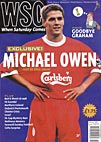 Steven Morgan explores the financial depths to which Portsmouth have sunk
Steven Morgan explores the financial depths to which Portsmouth have sunk
As Christmas presents go, it was like finally unwrapping something you’d asked for two years ago. Still, better late than never. Chairman Martin Gregory’s decision to quit Portsmouth on December 18th had been the top item on every fan’s festive wish list, such was the crippling financial damage wreaked during his three-year stint in charge.
Ten days later, Pompey met Oxford with the title of the First Division’s most badly run outfit at stake – their combined debts are estimated at £18 million and rising. Suitably, perhaps, it was a draw.
How did it come to this? In 1992-93, Jim Smith’s stylish team was within one goal of securing a Premiership place, having been the first – and still the only – side to lose a penalty shoot-out in an FA Cup semi-final the previous season. In 1994, proposals for the Parkway, a £20 million scheme for a new stadium complex at nearby Farlington – finally approved after a bitterly drawn-out planning wrangle at local level – were killed off by John Gummer at a Department of the Environment enquiry. Many would cite that body blow as the beginning of the end.
The then chairman Jim Gregory, the wheeler-dealing ex-QPR magnate who had bought the club in 1988, fell into ill health soon after the Parkway knockback, passing the reins on to his son Martin. Gregory junior – a skiing rather than football fanatic – was never comfortable at Fratton Park, so, at a time when football was supposedly entering its buy, buy, buy period, he decided to sell up. In May 1995 he mortgaged a 97 per cent shareholding in the club to Barclays Bank to prop up the family’s ailing Blue Star Garages business – while continuing to charge the club three per cent above the bank rate for loans made by the Gregorys.
He then had the gall to offer 51 per cent of these bound shares to Terry Venables for the seemingly bargain price of £1. Venables, showing the kind of finely-honed business sense that was soon to earn him a seven-year ban on being a company director from the High Court, had offered his services to the club – initially as a consultant – after Euro 96. His remit was, as he put it, to help “stop the bleeding”.
By the time he left in January 1998 – with most of us unsure whether he had ever actually been chairman or not, and despite selling Lee Bradbury, Deon Burton, Kit Symons and Darryl Powell for combined fees of more than £7 million, Portsmouth still faced a mountain of unpaid bills ranging from players’ wages to coach firms and hotels used for away trips.
One of the few bright spots in this sorry saga has been the conduct of manager Alan Ball who, though not possessing the greatest footballing brain, somehow kept the club up last season. Lately, he has shown himself to be so shrewd at PR Max Clifford should be taking notes. Not an easy task when your powers of buying and selling are put in the hands of an opera singer, impresario and “independent” agent with the deliciously reworkable name of Athole Still. Still’s first job was to sell the playing staff from a price list circulated to each of the other 91 clubs. The asking prices were laughable, but most have had the good grace not to act like vultures around a corpse.
To date, the only sale has been striker John Aloisi to Coventry for a ridiculous £650,000. This figure has confused many a Pompey fan, considering Ball had reputedly already agreed a fee of £1.5 million with Coventry boss Gordon Strachan. Bradford City’s bankers, meanwhile, refused to deal with Pompey at all after the clubs agreed a £500,000 deal for Sammy Igoe. This may have proved the final straw for an increasingly desperate Gregory. Stymied in attempting to sell the only thing he had left because of his own sullied business credentials, he gave up the ghost.
Whoever comes in – details of a consortium buyout are supposedly about to be unveiled – has a massive fight on their hands. Our debts of £5 million include tax bills you could paper a decent-sized living room with. Cult hero Johnny Durnin even had to pay for his own hospital scan before he was allowed to leave.
Besides shoring up our debts, equally important is the need to restore the huge debit on the goodwill front that is Gregory’s legacy. One of Portsmouth’s most famous supporters is the Fratton bugler John Westwood, who changed his middle name to Portsmouth FC and until recently had missed only five matches in 18 years. He was invited on to the pitch before the match with Grimsby on December 6th to pick up a special award from BBC Radio Solent in honour of the fans’ part in keeping Pompey up in 1997-98. He was then banned for supposedly leading the pitch invasion at half-time, which was absolute rot according to those who watched it.
At present he is still serving said ban, and has refused to go back until Martin Gregory has left the club. I fear he might have a long time to wait.
From WSC 144 February 1999. What was happening this month